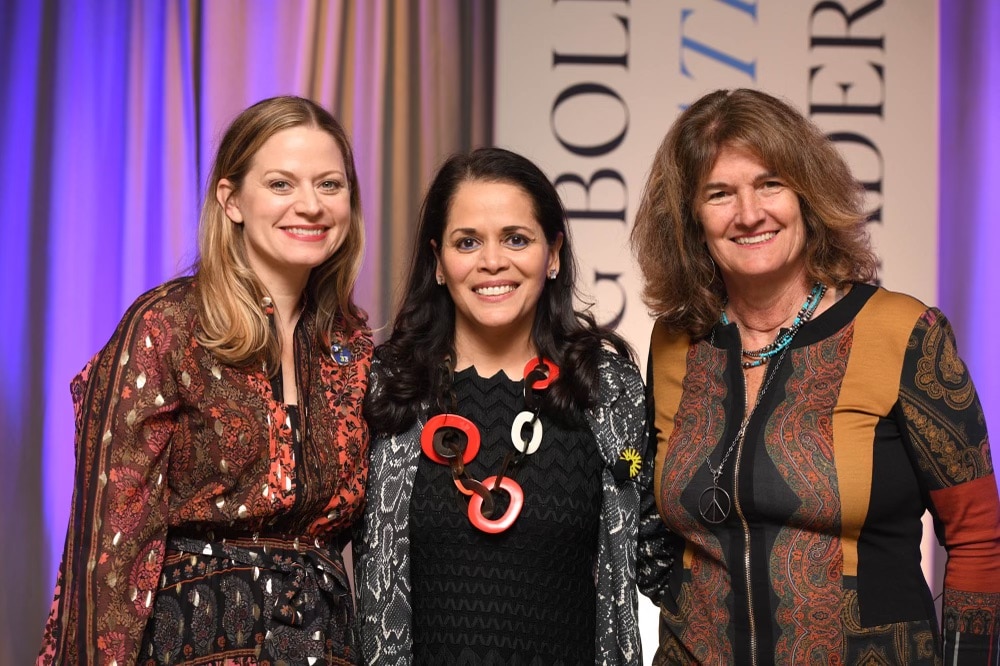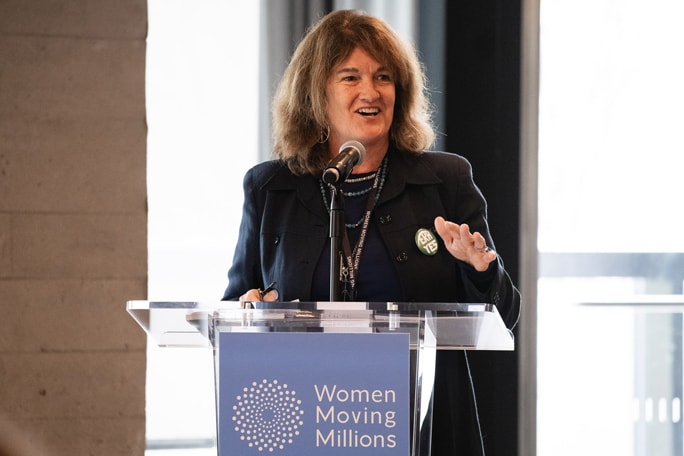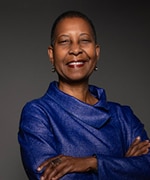In the world of philanthropy, there is a growing crop of female philanthropists that are blazing trails and setting new examples for how to maximize impact.
Stacey Keare is one of those trailblazers: She is the current board chair of Women Moving Millions, an impressive organization that has elevated the power of women's philanthropy by building the largest community of women, each giving a million dollars or more for the advancement of women and girls. Collectively, Women Moving Millions members have committed over $1 billion of giving.
In addition to being an attorney and a philanthropist, Stacey is also a public policy expert who cares deeply about making an impact in this world. For the past 20 years, Stacey has led her family foundation in finding and supporting innovative grassroots organizations that empower girls. Along with her husband, she founded the Girls Rights Project, an organization dedicated to advancing the rights of girls around the globe through research, advocacy and philanthropy.
Steph Wagner, National Director of Women & Wealth, sat down with Stacey for a virtual discussion on her impressive philanthropic career, her view of the evolution of women and giving, and her advice for others who aspire to lean into giving.
Read on for a brief excerpt from their conversation, or watch the full thought-provoking interview.
The following excerpt has been edited for clarity.
Steph Wagner: Philanthropy has really changed over the years, hasn't it? And particularly with women. We are all familiar with the stats that show we're in these unprecedented times: Women's economic power is expected to grow to the tune of $30 trillion by the end of this decade. That figure is mind-blowing when you think about what we can do with those resources to create good in the world. Can you share a little bit about the evolution that you've seen with women in philanthropy? And what do you see as the driving force behind the change?
Stacey Keare: One of the driving forces is certainly what you were just talking about, which is the transfer of wealth. I think this transfer of wealth — along with the evolution of women into new fields, into new work — together, that's driving both how women are doing things differently and also how much. The economic power we have available to us and the power we bring to that has changed dramatically. We all know Melinda French Gates and MacKenzie Scott — they are really important examples because I hope we see more of them. I think they're both taking on a mantle of wanting to be an example, and as we see an acceleration of wealth transfer, we hope there will be a lot more women like them to follow.
MacKenzie Scott has shown that you don't need bureaucracy — you don't need a whole big effort on the side of nonprofits to get grants. Her approach is to go out and find people who already are doing the work, and give them money with no strings attached. That was a huge change. When she started doing that, I think you could just see people perking up and thinking, ‘Oh, you can actually do this the way you want.’ And that has never happened before.
Melinda French Gates has transformed the Gates Foundation, which is having a huge impact on the whole women and girls ecosystem in the last 10 years. It was only 2014 when the Gates Foundation turned to having a gender equality focus, and in 10 years they've done all this work on the ecosystem to change it. Now, Melinda French Gates is getting involved in policy. She's getting involved in finding new ways to bring out grantees and to do things in a different way that doesn't require bureaucracy, doesn't require all of the old-school ways that large foundations have traditionally run. As leaders, Melinda and MacKenzie are really showing a new path forward.
But then, there's all these other levels where different women are doing incredible things. Just 20 years ago, there were there were only a handful of women’s funds, and now there's hundreds of women's funds around the world. There’s funds for helping Black girls. There's funds for Indigenous women. There's funds for lesbian rights. There's options for virtually everybody that didn't exist 30 years ago. So that whole landscape has changed.



There's also a relatively new organization called Philanthropy Together that's creating giving circles all around the country. A giving circle provides another way for people who don't have huge amounts of money to plug in, be part of something, have a community as well as learn how to give. So what I think is really exciting to watch is that it's become such a multilayered ecosystem: There are the big foundations, there's smaller foundations, there's women's funds, and then there's the networks like Women Moving Millions. There's something for everybody and they're all continuing to evolve and offer different possibilities.
SW: I love what you said about these two trailblazers who did it their own way, who came into this space and said, ‘Wait, we can shake this up. We can approach this differently and have an even bigger impact.’ And to your point, you don't have to be a billionaire in order to follow and take that example and apply it in your own world. You've laid out some wonderful examples that illustrate that it’s not a tier-based system of giving, but a broadening to participate at various levels.



I’d also like to discuss the evolution of giving in a different way that isn't direct philanthropy, thinking of things like investing in female founders, or women’s funds. It's not philanthropy directly, in the traditional sense, but it is part of making an impact. I think that's a form of innovation — where philanthropy blends with impact in a way that actually drives results for the investor. That is really exciting.
SK: Oh, it's huge. You know, it’s part of a larger question of what philanthropy means. This seems to be a very pervasive conversation as women who are giving in one way or another are getting younger, and as there are more women who are in the business world, who are starting companies, who are investors. It’s such an exciting thing to bring those communities together. At Women Moving Millions, we've opened up our membership to allow women who are investing in businesses that help women and girls because everyone will help each other, right? A lot of the people in Women Moving Millions, for example, have foundations and can learn about investing the money that they have to help women in different ways. And then the women who are investors, they also can learn about more traditional philanthropy and other ways to be an advocate or an activist through the philanthropic community. So in my mind it's just so valuable to bring them together.
What we’re finding is that the definition of philanthropy has changed. To many, it means ‘I just want to make a difference, so how do I do that?’ It might be by filmmaking, it might be advocacy work, it might be political work. But whatever it takes to make an impact is how philanthropy is designed today. It’s no longer just giving money and writing checks.
Watch the full inspiring conversation with Stacey Keare and Steph Wagner.
